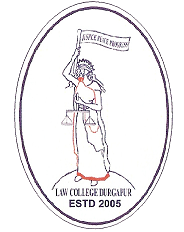[ad_1]
About the College
The college is a part of an educational hub situated beside National Highway No-2, having a composite campus spread on 65 acres of land. The campus is adorned with numerous educational institutions including an Engineering College, namely, Durgapur Institute of Advanced Technology and Management, a Management College, namely, Management Institute of Durgapur, a P.G. Science College, namely, Durgapur College of Commerce & Science, an ITI College, namely, Gouri Devi Private Industrial Training Institute, a CBSE School (10+2) namely, Manisha International School, a D.Ed. College, namely, Gouri Devi Teacher’s Training College and a Super Speciality Hospital, namely, Gouri Devi Hospital and Research Institute, Gouri Devi Nursing Academy apart from Law College Durgapur. Altogether, the campus has a total student strength of about 5000.
About Global Academy of Juridical Sciences (GLOAJUS)
GLOAJUS is a global collective of legal educators, professionals, and institutions committed to advancing the frontiers of legal knowledge and education. This organization is built on the foundation of collaboration, capacity building, and academic excellence in the legal field.
It creates opportunities for engagement through international conferences, workshops, academic training programs, and collaborative publishing ventures. It aims to be a trusted platform where institutions and individuals can access technical and academic support, co-develop initiatives, and contribute meaningfully to the global discourse on law and justice.
About the Conference
In the 21st century, technology has emerged as an indispensable tool in maintaining and enforcing law and order. With the advent of the digital age, law enforcement agencies and legal institutions worldwide are increasingly leveraging advanced technologies to address complex challenges related to crime prevention, detection, investigation, and adjudication.
From artificial intelligence (AI) and machine learning to surveillance systems, digital forensics, biometrics, blockchain, and predictive policing, the integration of technology has significantly enhanced the capacity of state and non-state actors in upholding justice and ensuring public safety. However, alongside the promise of efficiency and innovation, the use of technology in law enforcement also raises critical legal, ethical, and human rights concerns, particularly in areas of privacy, accountability, data protection, and the potential for abuse.
This international conference seeks to provide a multidisciplinary platform for scholars, legal practitioners, technologists, policy-makers, law enforcement officials, and civil society actors to critically examine the role of technology in the enforcement of law and order.
The aim is to foster an informed global discourse that not only highlights the opportunities created by technological innovations but also addresses the challenges and risks involved in their deployment. The conference will encourage comparative analysis of practices across jurisdictions, identifying successful models as well as failures, particularly in the context of democratic accountability, the rule of law, and access to justice.
Call for Papers
Law College Durgapur, in association with Global Academy of Juridical Sciences, invites scholarly papers on the theme “Role of Technology in the Enforcement of Law and Order” in line with subthemes prescribed for the technical sessions below.
Sub themes
- Artificial Intelligence and Predictive Policing: Promise and Perils
- Digital Evidence and Cyber Forensics: Challenges of Admissibility and Integrity
- Biometrics, Surveillance, and the Right to Privacy
- Cybercrime and Cybersecurity: Strengthening Legal and Institutional Responses
- Blockchain and Emerging Technologies in Criminal Justice Systems
- Technology and Human Rights: Ensuring Accountability and Equity in Law Enforcement
- Emerging New Jurisprudence due to Technological Interventions
- Emerging Issues of Digital Divide and Access to Justice
Important dates
- Date of Release of Brochure: June 26, 2025
- Last Date for Paper Submission: July 25, 2025
- Date for Confirmation of Selected Paper: July 27, 2025
- Last Date for Registration: August 03, 2025
Formatting Guidelines
The research papers shall adhere to the following formatting guidelines:
- The length of the paper shall not be less than 3,000 words and more than 5,000 words;
- The paper shall have an abstract of a maximum of 250 words with four to six keywords;
- The Heading of the paper shall be typed in Capital, Bold, Font Size 16, Times New Roman, Central Aligned;
- The main body shall be in Times New Roman, Font Size 12, Line Spacing 1.5, Justified Aligned;
- Sub-headings shall be in Bold but shall not be in the capital with Font Size 12, Line Spacing 1.5, Justified Aligned;
- Sub-Sub Headings shall be in italics with Font Size 12, Line Spacing 1.5, Justified Aligned,
- Sub-sub-sub-Headings shall be numbered with roman numerals;
- Images shall be Central Aligned and with clarity, and authorities shall be duly cited, wherein case if images are self created, then such shall be mentioned in the Footnote Section;
- All charts and tables shall be center-aligned and the authorities shall be duly cited;
- OSCOLA 4 th Edition shall be used for citation and footnotes shall be in Times New Roman, Font Size 10, Justified aligned, and Single Line Spacing.
Submission Guidelines
The participants shall strictly adhere to the following guidelines:
- Co-authorship for each paper is allowed for up to two authors;
- No single author can submit more than one paper;
- The Abstract shall be separately typed in, or pasted in the Google Form:
- In the case of two authors for the same paper, only one author shall fill up the submission form;
- No name or any other personal details shall be mentioned within the manuscript;
- All submissions shall be made through Google Forms;
- Only Word files are accepted, PDF files shall be summarily rejected.
How to Submit?
Interested candidates can submit entries via the link given at the end of the post.
Fee
- Academicians and Professionals: INR, 800
- Research Scholars & Students: INR: 500
Contact
Email: gloajusad@gmail.com
Phone: 8473808112
Click here to submit.
Disclaimer: WEF April, 2021, Lawctopus will not publish any ‘Call for Papers/Blogs’ by journals that charge money at the time of submission. If you find any journal doing so, please intimate us at tanuj.kalia[at]lawctopus.com
[ad_2]
Source link


